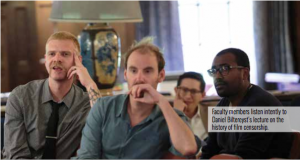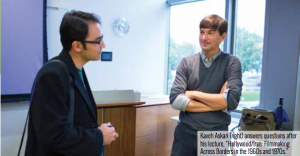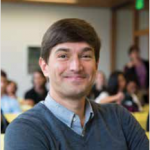Launched in the Fall of 2012, the Cinema Scholar Series has regularly invited distinguished scholars to the University of Oregon to present their research in cinema and media.
The scholars have presented their research to standing-room-only audiences of faculty, undergraduates, and graduates. This year’s topics have addressed filmmaking across borders in the 1960s and 1970s, television history, and the cultural and political roles of film censorship.
Story by: Janet Wasko
Photos by: Joshua Rainey

Lynn Spigel presents her talk, “TV Snapshots: An Archive of Everyday Life,” during the Winter Term 2015 Cinema Scholar Series event.
The annual Cinema Scholar Series for the 2014–15 academic year included three public lectures featuring notable cinema and media studies scholars. The inaugural lecture of the series featured Kaveh Askari, Associate Professor of English at Western Washington University. Askari’s presentation, “Hollywood/Iran: Filmmaking Across Borders in the 1960s and 1970s,” was based on his experience in Tehran researching the Hollywood archives on mid-twentieth-century Iran. Along with his work on Hollywood’s presence in Iran, Askari’s Making Movies Art: Picture Craft from the Magic Lantern to Early Hollywood will be published soon by the British Film Institute.
The winter lecture, “TV Snapshots: An Archive of Everyday Life,” was delivered by Lynn Spigel, the Frances E. Willard Professor of Screen Cultures at Northwestern University. Spigel is the author of several books on television, and she presented her ongoing research involving a collection of more than 5,000 family snapshots depicting people posing in front of their TV sets in the 1950s and ’60s. Spigel considers how snapshot cameras functioned as an “appendage technology” for television when TV first arrived in U.S. homes: “Snapshots were a ‘thing to do’ with TV beyond TV’s more obvious function as a spectator medium.”
Finally, Professor Daniel Biltereyst from Belgium asked students and faculty who packed into Gerlinger Lounge, “What can we learn from the history of film censorship?” Biltereyst is a professor in Film and Media Studies at Ghent University and has written extensively about film and screen culture as sites of controversy, public debate, and moral/media panic. His work on censorship spans the world and extends to current issues involving new media forms. He explained in his talk that today’s “media and communications seem at odds with the idea of censorship. However, in this so-called post-disciplinary society, there is a renewed interest in traditional models of censorship.”
packed into Gerlinger Lounge, “What can we learn from the history of film censorship?” Biltereyst is a professor in Film and Media Studies at Ghent University and has written extensively about film and screen culture as sites of controversy, public debate, and moral/media panic. His work on censorship spans the world and extends to current issues involving new media forms. He explained in his talk that today’s “media and communications seem at odds with the idea of censorship. However, in this so-called post-disciplinary society, there is a renewed interest in traditional models of censorship.”
From filmmaking across borders to television history to film censorship, the diverse set of research topics presented in the Cinema Scholar Series enriched the students’ experience and expanded their knowledge and interest in the study of film and media.
Cinema Scholar Series Speakers
-
Kaveh Askari
Associate Professor of English
Western Washington University
-
Lynn Spigel
Frances E. Willard
Professor of Screen Cultures
Northwestern University
-
Daniel Biltereyst
Professor in Film and Media Studies at the Department of Communication Studies
Head of Department and Director at the Centre for Cinema and Media Studies (CIMS)
Ghent University, Belgium




